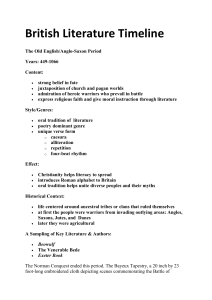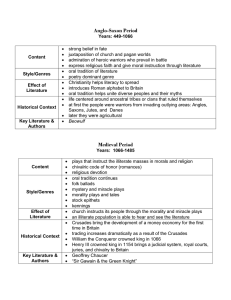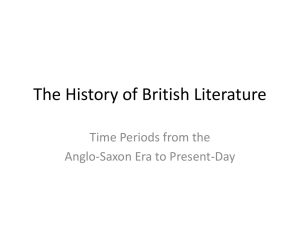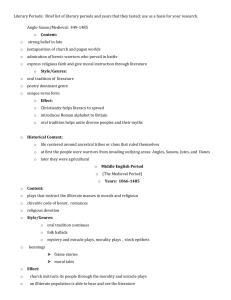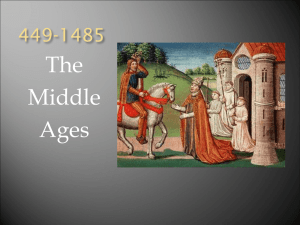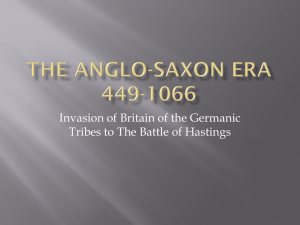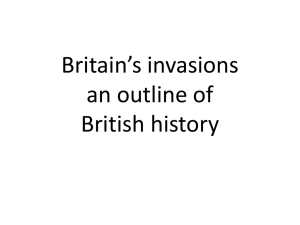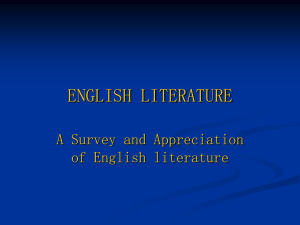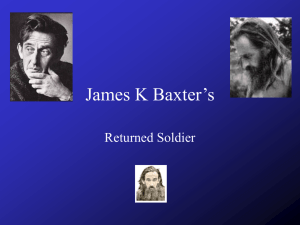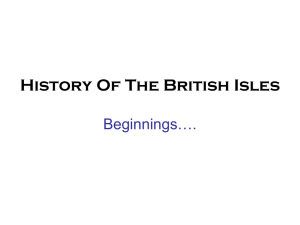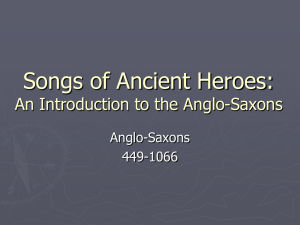Old English/Anglo-Saxon Period Years: 449-1066
advertisement
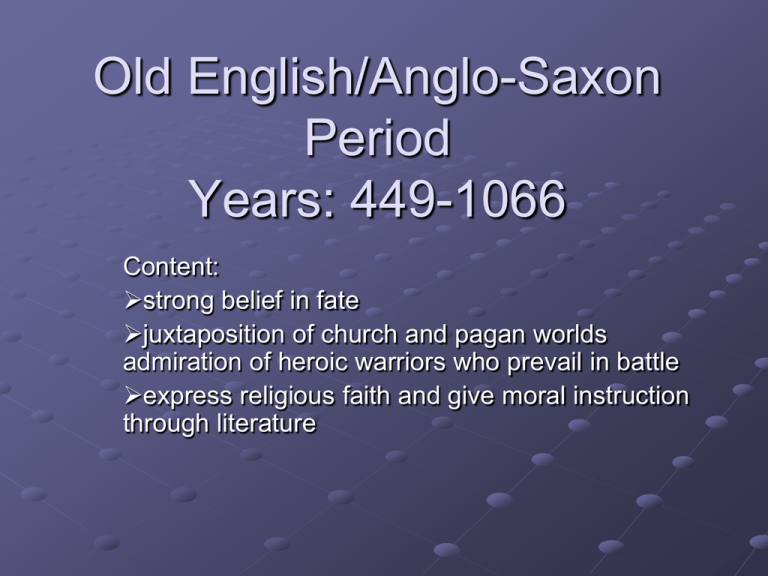
Old English/Anglo-Saxon Period Years: 449-1066 Content: strong belief in fate juxtaposition of church and pagan worlds admiration of heroic warriors who prevail in battle express religious faith and give moral instruction through literature The Anglo-Saxons: 449–1066 300s B.C.-Celts in Britain 55 B.C–A.D.409-Roman Occupation A.D. 400–699 Spread of Christianity A.D. 449-Anglo-Saxon Invasion A.D.878 King Alfred against the Danes A.D. 1066 Norman Invasion The Celts in Britain Before and during the 4th century B.C. Britain home to several Celtic tribes Britain named for one Celtic tribe—the Brythons King Arthur – famous Celtic King (516?) Celtic religion a form of animism (belief that Gods/spirits controlled all aspects of life and could take the form of trees, rivers, fire, thunder, etc) 449 AD The Anglo-Saxon Invasion Anglo-Saxon Society Warrior-based society, led by strong warrior chief “Warfare was the order of the day” (between clans, tribes, and outside invaders) Anglo-Saxon life was dominated by the need to protect the clan and home from enemies. Fame and success were achieved through loyalty to a leader, and success was measured by gifts received from leaders. The Anglo-Saxon Invasion Women had many rights in Anglo-Saxon society. Women inherited and held property (even when married) and were offered substantial gifts of money and land from prospective husbands. English emerged as a written language The Anglo-Saxon religion offered no hope of an afterlife…only fame offered immortality and provided a defense against death. valued concept of the “Heroic Ideal”…earthly virtues of bravery, loyalty, generosity, and friendship. The Anglo-Saxon bards called “scops” skilled storytellers and honored members of society. sang of heroic deeds regarded as equals to warriors Why were scops important? • Anglo-Saxons did not believe in an afterlife • warriors gained immortality through songs preserved in the collective memory. The spread of Christianity Around 400 AD Christian monks settle in Britain Christianity and Anglo-Saxon culture co-exist By 600 AD British pagan religions replaced by Christianity Genres: oral tradition of literature poetry dominant genre unique verse form Epic – a long, narrative poem that relates the great deeds of a larger than life hero who embodies (is made up of and reflects) the values of a particular society. Styles: Caesura: a plot is or break in a line of poetry used to emphasize the word or phrase that precedes it were two very the rhythmical effects. Alliteration: the repetition of consonant sounds at the beginnings of words, used to impart a musical quality to poems, to create mood, to reinforce meaning, to emphasize particular words, and to unify lines or stanzas. Continued Styles Repetition: The return of a word, phrase, stanza form, or effect in any form of literature. Repetition is an effective literary device that may bring comfort, increase memorization, suggest order, or add special meaning to a piece of literature. Kenning: metaphorical compound words or phrases substituted for simple nouns, ex. “whales’ home” for sea & “givers of gold” for rulers or emperors. Continued Styles Four Beat Rhythm: four beats to a line, is the meter of nursery rhymes, children’s jump-rope and counting-out rhymes, folk songs and ballads, marching cadence calls, and a good deal of art poetry. Effect: Christianity helps literacy to spread introduces Roman alphabet to Britain oral tradition helps unite diverse peoples and their myths Historical Context: life centered around ancestral tribes or clans that ruled themselves at first the people were warriors from invading outlying areas: Angles, Saxons, Jutes, and Danes later they were agricultural Key Literature/Authors: Beowulf Bede Exeter Book Middle English Period (The Medieval Period) Years: 1066-1485 Content: plays that instruct the illiterate masses in morals and religion chivalric code of honor romances religious devotion Style/Genres: oral tradition continues folk ballads: written by unknown authors and handed down orally, usually depict ordinary people in the midst of tragic events and adventures of love and bravery. They tend to begin abruptly, focus on a single incident, use dialogue and repetition, often contain supernatural elements, and suggest more than they actually state. mystery and miracle: drama written in the Middle Ages that portrays a biblical story. morality plays: a drama written in the Middle Ages that dramatizes conflict through allegory; the characters in morality plays are allegorical figures, such as Vice, Mercy, Death, and Good Deeds. Genre/Styles contin. stock epithets: A short, poetic nickname--often in the form of an adjective or adjectival phrase--attached to the normal name, ex) Robert the Devil, Richard the Lionheart. kennings: metaphorical compound words or phrases substituted for simple nouns, ex. “whales’ home” for sea & “givers of gold” for rulers or emperors. frame stories: a story is told within a narrative setting or frame creating a story within a story. moral tales: A traditional narrative (e.g., a fable, proverb, or urban legend) with a moral message warning of the consequences of certain actions, inactions, or character flaws. Effect: church instructs its people through the morality and miracle plays an illiterate population is able to hear and see the literature Historical Context: Crusades bring the development of a money economy for the first time in Britain trading increases dramatically as a result of the Crusades William the Conqueror crowned king in 1066 Henry III crowned king in 1154 brings a judicial system, royal courts, juries, and chivalry to Britain Key Literature/Authors: Domesday Book L’Morte de Arthur Geoffrey Chaucer The Renaissance Years: 1485-1660 Content: world view shifts from religion and after life to one stressing the human life on earth popular theme: development of human potential popular theme: many aspects of love explored unrequited love constant love timeless love courtly love love subject to change Style/Genres: poetry sonnet drama written in verse supported by royalty tragedies, comedies, histories metaphysical poetry elaborate and unexpected metaphors called conceits Effect: commoners welcomed at some play productions (like ones at the Globe) while conservatives try to close the theaters on grounds that they promote brazen behaviors not all middle-class embrace the metaphysical poets and their abstract conceits Historical Context: War of Roses ends in 1485 and political stability arrives Printing press helps stabilize English as a language and allows more people to read a variety of literature Economy changes from farm-based to one of international trade Key Literature/Authors: William Shakespeare John Donne Cavalier Poets Metaphysical Poets Christopher Marlowe Andrew Marvell Neoclassical Period (The Restoration) Years: 1660-1798 Content: emphasis on reason and logic stresses harmony, stability, wisdom Locke: a social contract exists between the government and the people. The government governs guaranteeing “natural rights” of life, liberty, and property Style/Genres: satire: uses irony and exaggeration to poke fun at human faults and foolishness in order to correct human behavior poetry essays letters, diaries, biographies novels Effect: emphasis on the individual belief that man is basically evil approach to life: “the world as it should be” Historical Context: 50% of the men are functionally literate (a dramatic rise) Fenced enclosures of land cause demise of traditional village life Factories begin to spring up as industrial revolution begins Impoverished masses begin to grow as farming life declines and factories build Coffee houses—where educated men spend evenings with literary and political associates Key Literature/Authors: Alexander Pope Daniel Defoe Jonathan Swift Samuel Johnson John Bunyan Romanticism Years: 1798 – 1832 Content: human knowledge consists of impressions and ideas formed in the individual’s mind introduction of gothic elements and terror/horror stories and novels in nature one can find comfort and peace that the man-made urbanized towns and factory environments cannot offer Style/Genres: poetry lyrical ballads Effects: evil attributed to society not to human nature human beings are basically good movement of protest: a desire for personal freedom children seen as hapless victims of poverty and exploitation Historical Context: Napoleon rises to power in France and opposes England militarily and economically gas lamps developed philosophy that government should NOT interfere with private enterprise middle class gains representation in the British parliament Railroads begin to run Key Literature/Authors: Novelists: Jane Austen, Mary Shelley Poets: Robert Burns, William Blake, William Wordsworth, Samuel Taylor Coleridge, Lord Byron, Percy Shelley, John Keats Content: Victorian Period Years: 1832-1900 conflict between those in power and the common masses of laborers and the poor shocking life of sweatshops and urban poor is highlighted in literature to insist on reform country versus city life sexual discretion (or lack of it) strained coincidences romantic triangles heroines in physical danger aristocratic villains misdirected letters bigamous marriages Genres/Styles: novel becomes popular for first time; mass produced for the first time bildungsroman: “coming of age” political novels detective novels: (Sherlock Holmes) serialized novels elegies poetry: easier to understand dramatic monologues drama: comedies of manners magazines offer stories to the masses Effect: literature begins to reach the masses Historical Context: paper becomes cheap; magazines and novels cheap to mass produce unprecedented growth of industry and business in Britain unparalleled dominance of nations, economies and trade abroad Key Literature/Authors: Charles Dickens Thomas Hardy Rudyard Kipling Robert Louis Stevenson George Eliot Oscar Wilde Alfred Lord Tennyson Charles Darwin Charlotte Bronte Robert Browning Modern/Post Modern Period of Literature Years: 1900-1980 Content: lonely individual fighting to find peace and comfort in a world that has lost its absolute values and traditions man is nothing except what he makes of himself a belief in situational ethics—no absolute values. Decisions are based on the situation one is involved in at the moment mixing of fantasy with nonfiction; blurs lines of reality for reader loss of the hero in literature destruction made possible by technology Genres/Styles: poetry: free verse epiphanies begin to appear in literature speeches memoir Novels stream of consciousness detached, unemotional, humorless present tense magic realism Effect: an approach to life: “Seize life for the moment and get all you can out of it.” Historical Context: British Empire loses 1 million soldiers to World War I Winston Churchill leads Britain through WW II, and the Germans bomb England directly British colonies demand independence Key Literature/Authors James Joyce Joseph Conrad D.H. Lawrence Graham Greene Dylan Thomas Nadine Gordimer George Orwell William Butler Yeats Bernard Shaw Contemporary Period of Literature (Post Modern Period Continued) 1980-Present Content: concern with connections between people exploring interpretations of the past open-mindedness and courage that comes from being an outsider escaping those ways of living that blind and dull the human spirit Genres/Styles: all genres represented fictional confessional/diaries 50% of contemporary fiction is written in the first person narratives: both fiction and nonfiction emotion-provoking humorous irony storytelling emphasized autobiographical essays mixing of fantasy with nonfiction; blurs lines of reality for reader Effect: too soon to tell Historical Context: a world growing smaller due to ease of communications between societies a world launching a new beginning of a century and a millennium media culture interprets values and events for individuals Key Literature/Authors: Seamus Heaney Doris Lessing Louis de Bernieres Kazuo Ishiguro Tom Stoppard Salman Rushdie John Le Carre Ken Follett
